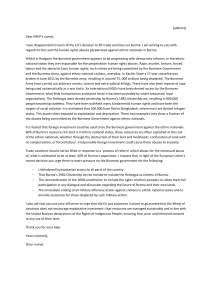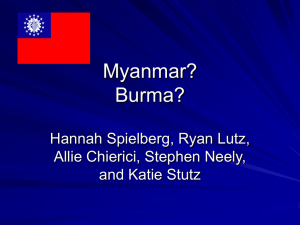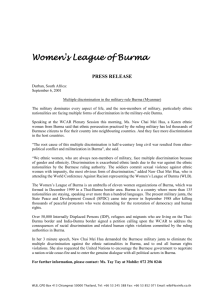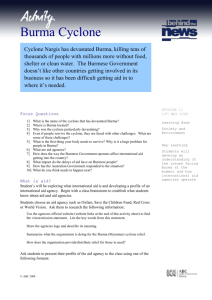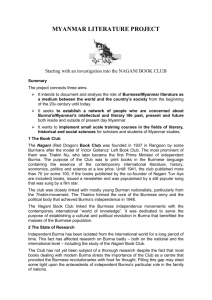Burma / Myanmar: prospects for democracy and rule of law” By
advertisement
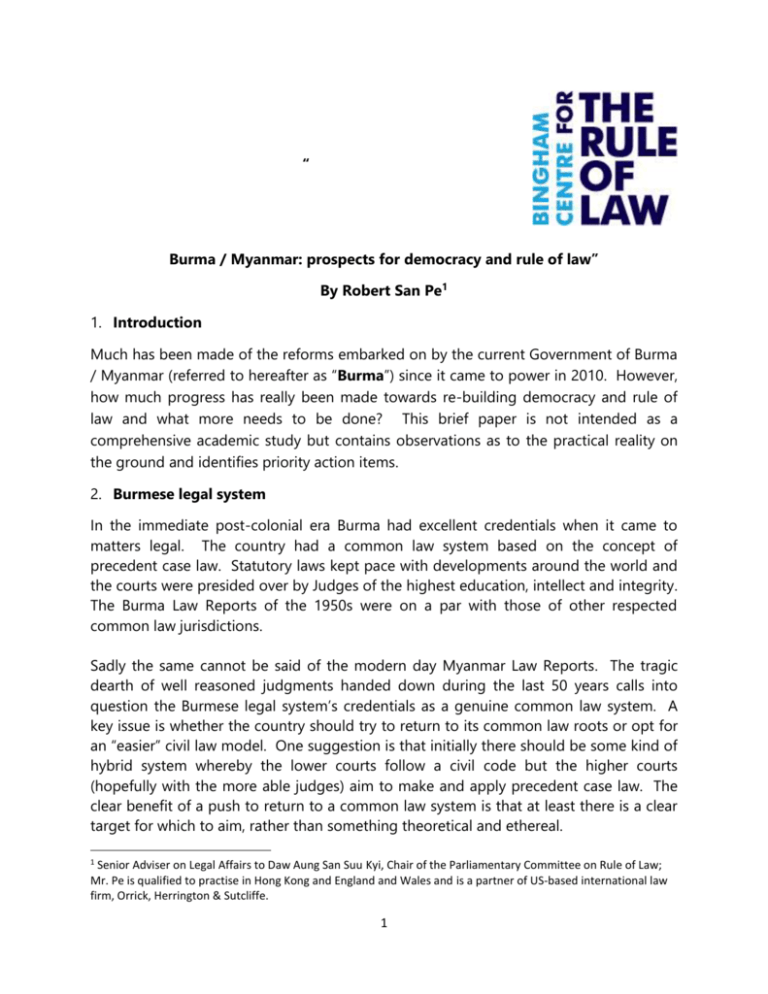
“ Burma / Myanmar: prospects for democracy and rule of law” By Robert San Pe1 1. Introduction Much has been made of the reforms embarked on by the current Government of Burma / Myanmar (referred to hereafter as “Burma”) since it came to power in 2010. However, how much progress has really been made towards re-building democracy and rule of law and what more needs to be done? This brief paper is not intended as a comprehensive academic study but contains observations as to the practical reality on the ground and identifies priority action items. 2. Burmese legal system In the immediate post-colonial era Burma had excellent credentials when it came to matters legal. The country had a common law system based on the concept of precedent case law. Statutory laws kept pace with developments around the world and the courts were presided over by Judges of the highest education, intellect and integrity. The Burma Law Reports of the 1950s were on a par with those of other respected common law jurisdictions. Sadly the same cannot be said of the modern day Myanmar Law Reports. The tragic dearth of well reasoned judgments handed down during the last 50 years calls into question the Burmese legal system’s credentials as a genuine common law system. A key issue is whether the country should try to return to its common law roots or opt for an “easier” civil law model. One suggestion is that initially there should be some kind of hybrid system whereby the lower courts follow a civil code but the higher courts (hopefully with the more able judges) aim to make and apply precedent case law. The clear benefit of a push to return to a common law system is that at least there is a clear target for which to aim, rather than something theoretical and ethereal. 1 Senior Adviser on Legal Affairs to Daw Aung San Suu Kyi, Chair of the Parliamentary Committee on Rule of Law; Mr. Pe is qualified to practise in Hong Kong and England and Wales and is a partner of US-based international law firm, Orrick, Herrington & Sutcliffe. 1 3. New Statute laws Many laws in Burma, such as the Companies Act 1914 or the Arbitration Act 1944, date back decades to the colonial era. The current Government has embarked on a drive to rush through numerous new statute laws. This seems to be driven at least partly by a desire to leave behind the colonial era. While that desire may be understandable, the reality is that in the rush to carry out this mammoth task, quality is the victim. Most of the new laws are drafted by “consultants” to the Government Ministries seeking to push them through. The Attorney General’s Office has a legal drafting unit but typically its members do not carry out the primary drafting and only review and amend in haste draft laws presented to them late in the day. In any event, they are underresourced and under-skilled. It is no surprise then that there is no consistency of approach in the drafting. Also, basic tools to make legislation user friendly, such as a table of contents, are usually missing. The new laws often fail to cover all the details you would expect primary legislation to cover. Instead there is a pattern of establishing a central body or commission that has a large degree of discretion. An example of this is the Myanmar Investment Commission or “MIC”. This means that there is no certainty as to the law, as some foreign investors have already been finding. It serves no purpose to revoke out-dated but once good laws and replace them with poorly formulated and poorly drafted new ones. It also serves no purpose unnecessarily to re-invent the wheel. Where a well-crafted and carefully considered model law is available off-the-shelf, the country should take it. An example of this is the United Nations Commission on International Trade Law (UNCITRAL) Model Law on International Commercial Arbitration. Rather than drafting an entirely new arbitration law or making major changes to the UNCITRAL Model Law, it would be best for Burma simply to adopt the Model Law in its entirety or in large part (we understand that the Attorney General’s Office now plans to follow this path but it has taken an unnecessarily long time to do so). This would immediately give foreign investors confidence in the arbitration law. Many of the old colonial and post-colonial laws are in English. The insistence on drafting new laws and Court judgments in the Burmese language often does not make sense and essentially destroys a potential competitive advantage that Burma would otherwise possess. Where the laws and judgments are purely domestic in scope, it is perhaps understandable that national pride should dictate that they be drafted in Burmese. However, where the aim is to attract foreign investment, it is not helpful for the law to be only in Burmese. At the very least there should be an official English translation of the law. English translations of the Foreign Investment Law 2012 are touted by street hawkers in Yangon to any foreigner stuck at a traffic light. These are 2 unofficial translations of dubious quality that leave foreign investors and their advisers guessing as to the actual content and meaning of the law. 4. The strengthening of Parliament The Parliament or Hluttaw has transitioned from being a rubber stamp to something much more than that. It has shown genuine teeth in pushing back on the Government. However, it is a work-in-progress. Many of the Parliamentarians are not well qualified for the work assigned to them. They have opportunities for intensive training but many of them are suffering from workshop fatigue. More alarmingly, the military are still in the Hluttaw and sit in a block of green uniforms. There is a severe lack of skilled Parliamentary staff, including researchers and legal advisers. The existing staff are treated almost like domestic servants or at best as secretarial / administrative support. Additional staff have been recruited but they need to be trained and that will take time. A starting point has been to work on their English language skills but much more is needed. All new draft laws go through the Bills Committee. Its workload is unmanageable and many of the Committee members lack relevant skills and training. With funding from the UK Department for International Development (DFID) we arranged for a foreign law draftsman to sit with the Committee from July to September 2013 and to observe and guide them in their work. He focused particular attention on trying to make their scrutiny principles more practical and user friendly. This was a start but, again, much more is needed. The Hluttaw library is a good example of progress in action but of more progress being required. It is located in a grand and impressive building within the Hluttaw compound. Like all the buildings in that compound, it is virtually impossible to reach except by car. Its opening hours coincide directly with Parliamentary working hours when most Parliamentarians are occupied. Many of the books in the library are arranged not by subject or author but rather by donor. The e-library looks superficially impressive in that it includes multiple modern-looking computer terminals. These contain scanned copies of numerous books. However, we were informed that each terminal contains only a selection of the books and that a user would therefore have to visit each and every terminal in order to access the entire collection. 5. Reform of the judiciary 3 The objectivity of the courts must be guaranteed before laws can be systematically and consistently upheld. As Daw Suu has said2: “our people do not trust the courts. We do not believe in justice as delivered by the courts and we know that for decades our courts of justice were not free from the influence of the executive”. Until the domination of the Judiciary by the Executive has been brought to an end, justice will remain arbitrary in Burma. Likewise, unless the pay and working conditions of judges and others involved with the administration of justice are improved, corruption will remain endemic. The judiciary has lagged behind in rebuilding and reviving itself in this new era. The International Commission of Jurists (“ICJ”) indicated3 that corruption is “corrosive and pervasive - it underlies and affects every aspect of a lawyer’s career” and that “The public also generally assumes that corruption will play a part in any interaction involving the legal system”. The ICJ has indicated that a top priority is to establish a committee of judges to investigate allegations against the judiciary. This makes sense but it will be crucial to take time in identifying suitable, incorruptible candidates to serve on the committee. Also, the establishment of this committee should occur in tandem with (but more quickly than) the establishment of a broader national anti-corruption body. There is a judicial training institute but its work has been ongoing for years and has borne little fruit in terms of a strengthened judiciary. On the positive side, it is clear that there are some able and incorruptible judges in the country. In June 2013 with support from the International Council for Commercial Arbitration (“ICCA”) and others we ran a judicial workshop on dealing with foreign arbitral awards under the New York Convention on the Recognition and Enforcement of Foreign Arbitral Awards. The participants comprised 13 Burmese judges, two Parliamentarians and a senior lawyer. The judges had been hand-picked and were of varying levels of seniority. The trainers comprised leading figures from the international arbitration community, including the founding father of the Hong Kong International Arbitration Centre and a Singaporean arbitration list judge. The workshop lasted for 4 days and at the outset it was clear that the Burmese participants knew little or nothing about arbitration or the New York Convention. The workshop was deliberately practical and participatory and included a mock jurisdictional challenge to an arbitral tribunal and multiple real life case studies. The Burmese participants devoured the course with enthusiasm, dedication and interest. Initially 2 At a European Union seminar on “Rule of Law in Myanmar: Perspectives and Prospects” on 9 February 2013 in Naypyitaw. 3 In their report “Right to Counsel: The Independence of Lawyers in Myanmar” launched on 3 December 2013 in Yangon. 4 some of the more senior judges were reticent, perhaps concerned about disclosing any weaknesses in front of more junior colleagues. However, they soon relaxed and became active participants. The positive reaction to the workshop gave significant cause for optimism. 6. Building a strong and independent legal profession As far back as the Bar Council Act 1929, which followed the Indian Bar Council Act 1926, the Bar Council in Burma was chaired by the Attorney General. This continued during the military era and in the current draft Bar Council Law the Attorney General has sought to retain his role chairing the Bar Council. This is not consistent with developments elsewhere in the world pursuant to which it has been viewed as crucial for the private legal sector to be independent of Government. In most developed jurisdictions the legal profession is largely self-regulating. This is often done through a bar association. In Burma there are various de facto regional bar associations but these have been denied legal registration since the late 1980s when the State Law and Order Restoration Council (“SLORC”) took power. In 2013 the process was commenced of establishing a Myanmar Lawyers Association (“MLA”). The MLA has encountered difficulties – both in obtaining the status of a legally registered association under the new Associations Law and because of (almost inevitable) accusations that it is too Yangon-centric and not sufficiently representative of the regions. The International Bar Association (“IBA”) and the Parliamentary Committee on Rule of Law held a seminar4, which proved a useful step in the work towards building a strong and independent national bar association. Participants were drawn from across the country and there was a strong consensus that the Bar Council needed to be independent of Government if it was to regulate the legal profession and that there also needed to be a strong and independent national bar association to represent the legal profession. During the course of the seminar we were able to bring together the leaders of the regional bar associations and some of the leaders of the MLA and of another organization, the Myanmar Lawyers’ Network. They agreed to work together to establish a unified national bar association and created an interim committee for that purpose. We will aim to support and encourage them and we understand that the IBA will do likewise. 7. Upgrading the legal profession to scale 4 “Bar Associations’ Best Practices: An International and Regional Approach” from 13 to 15 February 2014 in Naypyitaw. 5 As mentioned at section 5 above, in June 2013 we ran a judicial workshop on dealing with foreign arbitral awards under the New York Convention. It was a big success but as a senior UNDP consultant observed, we were just scratching the surface. The key reasons that many rule of law projects come to nothing is because of a failure to address the scale of the problem and a failure to combine upgrading of the profession with improved access to justice for the population as a whole. University education in Burma, including legal education, has been terribly eroded. It must be improved so that it is able systematically to turn out new graduates with an acceptable level of knowledge, skills and values. However, even if comprehensive efforts to improve legal education at Burmese universities begin tomorrow (and some efforts are already under way), it will take many years before they bear fruit. Those who graduate from university in, say 2025, will not be in positions of influence in the legal profession for another 10-15 years after that. For at least the next 20 years, the formal legal system throughout the country, and in all branches of the legal profession, will be largely in the hands of those who graduated and practised during the previous military regimes; Many legal practitioners in Burma are not well equipped to carry out their roles. In a country of around 65 million people it will be a big job to remedy the situation. Donor sponsored workshops, rule of law conferences, some strengthening of professional institutes and a trickle of graduate study abroad will not help much. There are over 30 separate rule of law projects under way but co-ordination is not always strong. In October 2013 we issued a consultation paper on the concept of professional training organized through a series of 4 or 5 regional rule of law centres (“RLCs”) in Burma. The aim would be to provide comprehensive professional training for the entire legal profession – judges, prosecutors, private practice lawyers, paralegals and law professors. This could be done by private sector providers, who could be required and incentivized to co-ordinate with and, where feasible, involve the numerous multinationals, law firms, international legal organisations, bar associations, universities and NGOs who are seeking opportunities to assist Burma rebuild rule of law. The RLCs would place emphasis on active learning and on improving practical skills such as legal analysis, writing, research, advocacy and counseling. They would broaden understanding of legal professional values such as professional ethics, government service, pro bono service and protection of human rights. 6 The RLCs would provide recognition/certification so that participants could demonstrate to employers, clients, universities, civil society organizations and others that they had completed the RLC programme. Certification would be meaningful so that successful completion of the RLC programme would become a valuable professional asset. That almost certainly means rigorous examinations. Following the consultation process, Daw Aung San Suu Kyi and the Parliamentary Speaker, U Shwe Mann, convened a meeting, which all the relevant justice sector actors and the UNDP attended. The United Nations Development Program (“UNDP”) is working on a feasibility study now. The aim is to funnel much of the goodwill thrown at the country into a well-managed and ambitious project so as to provide an example of Burmese leadership and international co-operation and co-ordination. It will be important to link the RLCs to an equally ambitious access to justice programme. 8. Review of the country’s 2008 Constitution Burma’s third and current constitution was adopted following a referendum on 10 May 2008. The referendum was held just eight days after Cyclone Nargis, the most devastating natural disaster in modern Burmese history. There was little or no public participation in the production of the text of the Constitution. The proposed text was published just one month before the referendum and was not available to a large part of the electorate. Rule of law in Burma will remain shallow and unstable until the government itself undergoes genuine democratic reform. In July 2013 a Joint Parliamentary Committee for Reviewing the Constitution (the “Joint Committee”) was established. It comprised 109 members of the Hluttaw. Its composition was roughly proportionate to the number of seats each political party held in the Hluttaw. The National League for Democracy (“NLD”) had 7 members on the Joint Committee reflective of its 43 seats in the Hluttaw. Of course this composition did not reflect the fact that the NLD had been barred from participating in the 2010 general election and that in the 2012 by-elections it had won 43 of the 44 seats it had contested out of a total of 45 seats where elections were held. The Joint Committee’s aims were stated to be: “guaranteeing the perpetuation, peace, stability and development of the Republic; bringing eternal peace to all national races and ethnic people by bringing unity between them; and carrying on democratic reforms for building the state.” 7 In early October 2013 the Joint Committee announced a nationwide consultation exercise. Some features of this consultation exercise were as follows: 1. It was announced by small and inconspicuous newspaper advertisements; 2. There was a short consultation period – initially until the end of November 2013, although this was later extended by a month to the end of December 2013; and 3. Submissions to be sent to an address in Naypyitaw where they were unlikely ever to be received unless delivered by hand. We organised a “Constitutional Awareness” workshop in October 2013 for members of the nascent MLA, which is a non-political professional body with members from across the political divide. We collaborated closely with LexisNexis and the Bingham Centre for the Rule of Law, who produced a helpful booklet on the Constitution. The Bingham Centre flew out on short notice an English barrister, who delivered two short and interesting lectures on the Constitution. However, most of the workshop was given over to structured group discussion. Unusually for a large group of lawyers, there was unanimity on several of the priorities for change in the Constitution: 1. Section 436 (Amendment of the Constitution) - the provision that 75% + 1 of the Hluttaw must give prior approval to any amendment of the specified sections of the constitution should be deleted; 2. Sections 109 and 141 (Representation in the Hluttaw) - all members of the Hluttaw should be elected by the people of Burma. Some people suggested reducing the proportion of Defence Services Representatives to nil in phases (for example to 15% in the first term and thereafter to nil); 3. Section 59 (Qualifications of the President and Vice-President) - the criteria for qualification of the President and Vice President in sections, 59(c), 59(d), 59(e), 59(f) and 59(g) should be deleted in their entirety. It was agreed that the President should be a person of high calibre and wisdom, but considered that the electorate could judge these qualities; 4. Section 40 and Chapter XI (Provisions on State of Emergency) - the provisions relating to a state of emergency should be significantly more restricted, tightly defined and controlled; 5. Chapter VI and Sections 19, 299-301, 321 (Independence of the Judiciary) – the contents of section 19 of the Constitution should be augmented by specific provisions to secure independence and incorruptibility. 8 We strategized about how to raise constitutional awareness among the population as a whole and decided on the idea of bus tours as used in Libya. We obtained funding and involved a local NGO, Pyoe Pin, to help organize the tours and deal with logistics. The Bingham Centre flew out two English barristers who accompanied Burmese lawyers on the first bus tour. Pyoe Pin subsequently organized further bus tours. The Bingham Centre and Pyoe Pin collected literally hundreds of submissions, which they later delivered to the Joint Committee. On 31 January 2014 the Joint Committee issued its report. It was something of an anticlimax – 10 pages long and, contrary to some media coverage, it did not include any serious analysis or recommendations. It primarily set out data, including the number of submissions received in respect of each section of the Constitution, and brief comments. There was a letter campaign against amending section 59(f) and this was highly suspect. Those resisting change in Burma have a track record of employing quasi-military tactics to get the vote that they want. By way of example, for the 2010 election they: 1. de-registered the NLD so that it became a non-party and could not participate; 2. formed the USDP out of the Union Solidarity and Development Association (USDA), a regime-sponsored mass organisation to which all government employees were compelled to belong; 3. ran advertisements in the regime's newspaper, New Light of Myanmar, urging people to vote and indicating that "a person who is found guilty of inciting the people to boycott the election is liable for not more than one year's prison term or a fine of 100,000 kyats"; and 4. organised regimented voting in advance - civil servants and other state employees, such as members of the fire brigade, were pressed into voting en masse for the USDP. A smaller Parliamentary Committee to Implement Constitutional Amendments has now been formed to draft recommendations and to produce a meaningful report. It has 31 members – 14 USDP, 7 Tatmadaw (military), 2 from the NLD and 1 each from other parties. Its work will apparently be based on the report of the previous Joint Committee. Recommendations can be solicited from the Supreme Court, ministers, regional Parliaments and lawyers. No timeline has as yet been fixed for this new Committee to complete its work, although there have been reports (in mid-February 2014) that the Parliamentary Speaker, U Shwe Mann, has indicated that decisions on constitutional reform should be concluded at least 6 months before the General Election in 2015. We will monitor closely the progress of the new Joint Committee to ensure that it is not 9 used simply as a delaying tool. It is our view that these constitutional issues need to be resolved in 2014 and at least one year in advance of the election (the precise date for which has yet to be fixed). 9. Conclusion and outlook Some progress has been made towards rebuilding democracy and rule of law in Burma but there is still a long way to go. The current constitutional review process is the acid test of whether the Government is genuinely a reforming Government. It is crucial that the international community maintains the pressure for change. This year is likely to be decisive in indicating the direction of the country. 21 February 2014 10

